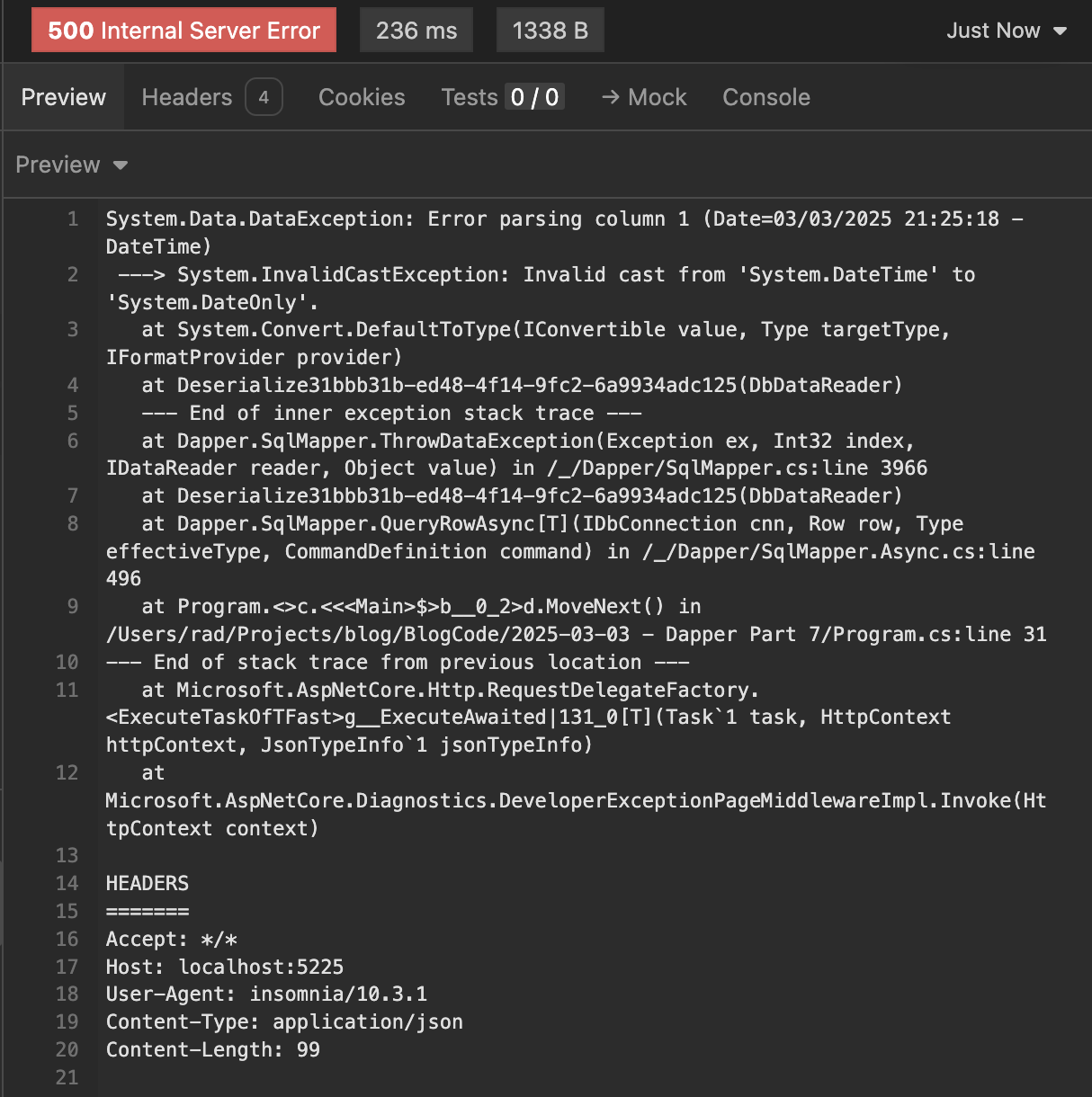Dapper Part 7 - Adding DateOnly & TimeOnly Support
[C#, .NET, Dapper, Database]
This is Part 7 of a series on using Dapper to simplify data access with ADO.NET
- Simpler .NET Data Access With Dapper - Part 1
- Dapper Part 2 - Querying The Database
- Dapper Part 3 - Executing Queries
- Dapper Part 4 - Passing Data To And From The Database
- Dapper Part 5 - Passing Data In Bulk To The Database
- Dapper Part 6 - Returning Multiple Sets Of Results
- Dapper Part 7 - Adding DateOnly & TimeOnly Support (This Post)
- Dapper Part 8 - Controlling Database Timeouts
- Dapper Part 9 - Using Dynamic Types
- Dapper Part 10 - Handling Cancellations
- Dapper Part 11 - Using Inheritance
- Dapper Part 12 - Alternative Bulk Insert Technique
- Dapper Part 13 - Using Transactions
- Dapper Part 14 - Multithreading
- Dapper Part 15 - Using The IN Clause
- Dapper Part 16 - Consideration When Passing Parameters
In our last post, we looked at how to send a batch of SQL statements and retrieve their results in a batch.
In this post, we shall look at how to overcome a problem with type mapping.
Assume you have the following type:
public sealed class DateInfo
{
public string Name { get; } = null!;
public DateTime DateAndTime { get; }
}
This is populated by the following query:
SELECT
'CurrentDate' Name,
GETDATE() DateAndTime;
We can build a simple endpoint to retrieve this data:
app.MapGet("/Info/v1", async (SqlConnection cn) =>
{
const string query = """
SELECT
'CurrentDate' Name,
GETDATE() DateAndTime;
""";
var result = await cn.QuerySingleAsync<DateInfo>(query);
return result;
});
This will return the following:

{
"name": "CurrentDate",
"dateAndTime": "2025-03-03T21:20:04.527"
}
One of the changes in .NET 6 was a realization that we often need the date and not the time component, or vice versa. And thus, DateOnly and TimeOnly types were introduced.
We might want to take advantage of this.
So, we start by changing our type as follows:
namespace V2
{
public sealed class DateInfo
{
public string Name { get; } = null!;
public DateOnly Date { get; }
}
}
And a new endpoint with a slightly modified query:
app.MapGet("/Info/v2", async (SqlConnection cn) =>
{
const string query = """
SELECT
'CurrentDate' Name,
GETDATE() Date;
""";
var result = await cn.QuerySingleAsync<V2.DateInfo>(query);
return result;
});
If we run this:

It returns an exception - it cannot convert from a DateTime to a DateOnly.
System.Data.DataException: Error parsing column 1 (Date=03/03/2025 21:25:18 - DateTime)
---> System.InvalidCastException: Invalid cast from 'System.DateTime' to 'System.DateOnly'.
at System.Convert.DefaultToType(IConvertible value, Type targetType, IFormatProvider provider)
at Deserialize31bbb31b-ed48-4f14-9fc2-6a9934adc125(DbDataReader)
--- End of inner exception stack trace ---
at Dapper.SqlMapper.ThrowDataException(Exception ex, Int32 index, IDataReader reader, Object value) in /_/Dapper/SqlMapper.cs:line 3966
at Deserialize31bbb31b-ed48-4f14-9fc2-6a9934adc125(DbDataReader)
at Dapper.SqlMapper.QueryRowAsync[T](IDbConnection cnn, Row row, Type effectiveType, CommandDefinition command) in /_/Dapper/SqlMapper.Async.cs:line 496
at Program.<>c.<<<Main>$>b__0_2>d.MoveNext() in /Users/rad/Projects/blog/BlogCode/2025-03-03 - Dapper Part 7/Program.cs:line 31
--- End of stack trace from previous location ---
at Microsoft.AspNetCore.Http.RequestDelegateFactory.<ExecuteTaskOfTFast>g__ExecuteAwaited|131_0[T](Task`1 task, HttpContext httpContext, JsonTypeInfo`1 jsonTypeInfo)
at Microsoft.AspNetCore.Diagnostics.DeveloperExceptionPageMiddlewareImpl.Invoke(HttpContext context)
There are two ways to go about this:
1. Computed Column
We can move this from a Dapper problem to our problem by doing the conversion ourselves.
We change the type slightly to add a computed column:
namespace V3
{
public sealed class DateInfo
{
public string Name { get; } = null!;
public DateTime DateAndTime { get; }
public DateOnly Date => DateOnly.FromDateTime(DateAndTime);
}
}
Here, we compute the Date property from the DateAndTime.
If we run this:
{
"name": "CurrentDate",
"dateAndTime": "2025-03-03T21:35:11.947",
"date": "2025-03-03"
}
This works well, but there is much to say about duplicating data.
2. Extending Dapper
The other option is to extend Dapper to do the conversion for us.
This is done by subclassing the generic SqlMapper.TypeHandler<T> to implement our own conversion to and from our desired type.
The class looks like this:
public class SqlDateOnlyTypeHandler : SqlMapper.TypeHandler<DateOnly>
{
public override void SetValue(IDbDataParameter parameter, DateOnly date) => parameter.Value = date.ToDateTime(new TimeOnly(0, 0));
public override DateOnly Parse(object value) => DateOnly.FromDateTime((DateTime)value);
}
We then configure Dapper using the static SqlMapper.AddTypeHandle method. This can be done at the start of the program.
var builder = WebApplication.CreateBuilder(args);
// Setup DI to inject a Sql Server connection
builder.Services.AddSingleton<SqlConnection>(_ => new SqlConnection(connectionString));
// Configure Dapper to support DateOnly
SqlMapper.AddTypeHandler(new SqlDateOnlyTypeHandler());
var app = builder.Build();
Our v2 endpoint should now work:
app.MapGet("/Info/v2", async (SqlConnection cn) =>
{
const string query = """
SELECT
'CurrentDate' Name,
GETDATE() Date;
""";
var result = await cn.QuerySingleAsync<V2.DateInfo>(query);
return result;
});
This will return the following:
{
"name": "CurrentDate",
"date": "2025-03-03"
}
We can also use this same technique to map a TimeOnly from our response:
namespace V4
{
public sealed class DateInfo
{
public string Name { get; } = null!;
public TimeOnly Time { get; }
}
}
Our endpoint will look like this:
app.MapGet("/Info/v4", async (SqlConnection cn) =>
{
const string query = """
SELECT
'CurrentTime' Name,
GETDATE() Time;
""";
var result = await cn.QuerySingleAsync<V4.DateInfo>(query);
return result;
});
We then create our mapper:
public class SqlTimeOnlyTypeHandler : SqlMapper.TypeHandler<TimeOnly>
{
public override void SetValue(IDbDataParameter parameter, TimeOnly time) => parameter.Value = time.ToString();
public override TimeOnly Parse(object value) => TimeOnly.FromTimeSpan(((DateTime)value).TimeOfDay);
}
And register it at startup:
var builder = WebApplication.CreateBuilder(args);
// Setup DI to inject a Sql Server connection
builder.Services.AddSingleton<SqlConnection>(_ => new SqlConnection(connectionString));
// Configure Dapper to support DateOnly
SqlMapper.AddTypeHandler(new SqlDateOnlyTypeHandler());
// Configure Dapper to support TimeOnly
SqlMapper.AddTypeHandler(new SqlTimeOnlyTypeHandler());
var app = builder.Build();
If we run our endpoint, we will see the following:
{
"name": "CurrentTime",
"time": "21:48:41.9730000"
}
In our next post, we will look at how to deal with database timeouts.
TLDR
Dapper allows you to write your own type handlers to handle conversions to and from native .NET types.
The code is in my GitHub.
Happy hacking!